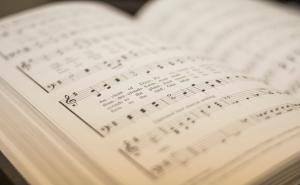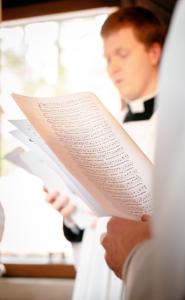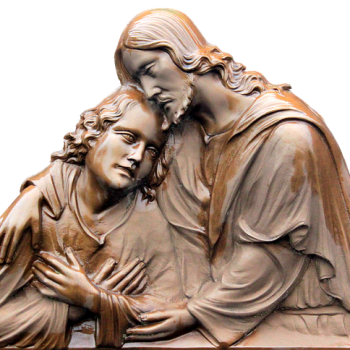Do you sing at Mass? You should! The music is not just background accompaniment to the experience of Mass. Rather, Catholic hymns are an integral enhancement of the liturgical message.
The music carries a meaningful link to the message of the readings. These follow a different theme at each celebration. For example, on the Feast of the Epiphany, the first reading comes from Isaiah (60:1-6)—he predicts the coming of the nations to the light of Christ “bringing gold and incense.”
Psalm 71 is used for the Epiphany: “All nations shall fall prostrate before you, O Lord.” The second reading is from Second Ephesians (3:2-3, 5-6) telling us that the “pagans [gentiles] now are part of the same body in Christ.”
The gospel is, of course, the story from Matthew (2:1-12) about the coming of the Magi. So, all the readings tie together not only for the unity of the message, but also to show the fulfillment of the prophecies and the consistency of God’s plan through the ages.
The music for the Epiphany follows the same theme. Therefore, we expect to hear “We Three Kings” or other songs about the Magi or perhaps selected verses from familiar carols.
For example: the third verse of “Angels, from the Realms of Glory” is relevant: “Sages, leave your contemplations, Brighter visions beam afar, Seek the great Desire of Nations, Ye have seen his natal star.”

Choosing the Music
It’s the job of the music director or provider to choose appropriate hymns to match the theme. If the reading includes: “Seek and ye shall find, knock and it shall be opened,” the song “Seek Ye First” is a natural because it contains those exact words.
If the Psalm is #96 saying: “Sing to the Lord a new song,” then the obvious choice for one of the songs at that Mass is “Sing a New Song.” It’s not always that close a match but think of the impact if the reading contains those words and then the song does too. Makes an impression. Makes you think about the message.
Some parishes sing basically the same songs every Sunday because they are favorites and, since people know them, they will be more willing to join in. It’s my opinion that the purpose of the readings is not then absorbed as thoroughly as they might be if the congregants reiterated the message in song.
Other parishes rely on a choir to learn the songs and lead the congregation in singing them. The hope is that congregants will listen and learn rather than just listen to the choir as if the music is entertainment.
As a music minister at my church, my selection is aided by the grouping of hymns in categories such as praise, peace, faith and unity. I also have a liturgical guide that matches Bible verses to specific songs and an online resource for suggested songs. https://www.liturgytools.net/p/roman-catholic-lectionary-based-hymn.html
Learning and Connecting with Music

The reason all of this is so important is not only so that the music can re-iterate the message of the readings, but also so that the music can make an emotional connection with the people at Mass.
Since Mass proceeds in a step-by-step predictable manner, some Catholics get bored with what they think is the same old, same old, and they just go through the motions. The music, though, can get their attention.
Music stirs the soul. It reaches the heart. If the people at Mass really get involved in the music, the Mass will be so much more enriching. I know this through testimony.
Some of my friends have requested songs that are meaningful to them. Others have said certain songs have such beautiful lyrics that they don’t sing but just listen to the music while they contemplate the words.
Songs in the comfort or trust categories tend to cause that reaction. Who isn’t affected by lines like “Yahweh, I know you are near, standing always at my side;” or “Be not afraid, I go before you always” accompanied by beautiful, poignant music?
Then there are the uplifting songs or those with stirring music “Sing to the Mountains” or “How Great Thou Art” or “On Eagle’s Wings.” Sadly, many people don’t realize the significance of the lyrics or the power of the melody until they pick out songs for a wedding or funeral.
While we want everyone to sing—remember, those who sing pray twice—the aim is for people at Mass to absorb the faith, hope and love in the lyrics and appreciate the lessons they convey in concert with the readings. What a rich experience it makes for Mass!
















